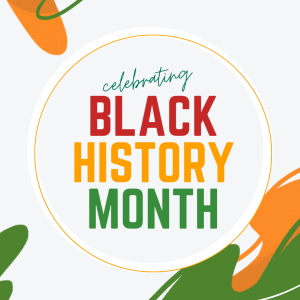The theme of this year’s Black History Month, “African Americans and the Arts,” beckons us to explore the intersections of creativity and heritage, echoing these timeless words by James Baldwin with renewed significance:
“The world is before you, and you need not take it or leave it as it was when you came in.”
From antiquity to present, Black sculptors, musicians, poets, novelists and artists of all mediums have profoundly impacted history, giving birth to many important cultural and historical movements. From New Orleans to Harlem to San Francisco, African Americans in the arts have challenged societal norms while enriching America’s cultural tapestry. Their work not only reflects the rich diversity of the Black experience but also serves as powerful catalysts for social change, fostering conversations about identity, equality, and justice.

A vibrant red, orange and green image that reads “celebrating Black History Month.”
In celebrating this month’s theme of “African Americans and the Arts,” many of us stand at the forefront in delivering rich, artistic programming to support the future artists and performers of tomorrow. All too often, community colleges are tarred with a “workforce” brush that says, “all we do is train welders and plumbers,” in short, a type of anathema to the world of higher education. At CCBC we believe that “Everything we do is workforce development,” whether we are educating accountants, nurses, and plumbers or dancers, musicians, writers, and artists.
Black History Month, initially a means of educating young minds about the valuable contributions of African Americans, has now transformed into a celebration honoring Black innovators whose influence has left an undeniable mark on the world. This year’s celebration serves as a powerful reminder of the resilience, creativity, and enduring impact of Black artists throughout history. As we nurture the talents of aspiring artists in our community college classrooms, we could very well be shaping the future of the next Carter G. Woodson, Billie Holiday, Hanif Abdurraqib, Alvin Armstrong or Maya Angelou.
